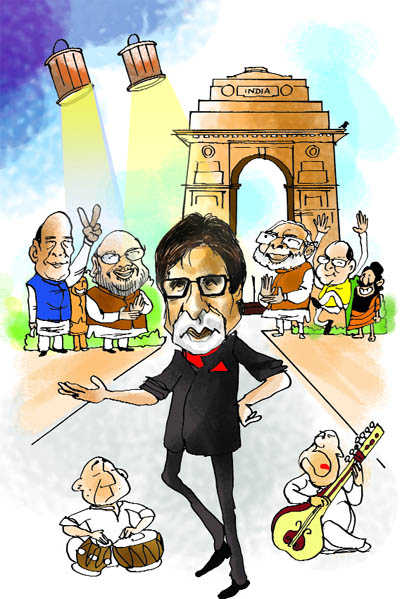
Illustration by Sandeep Joshi
ON Saturday night, at India Gate, we had quite a bit of song and dance. It was the modern equivalent of old-fashioned melas. For the show, many Bollywood personalities, including the ubiquitous Amitabh Bachchan, were roped in to entertain the audiences. And, of course, no prize for guessing that the evening was telecast ‘live’ right into our homes. We have now come to expect such choreographed evenings as normal, because of the Modi sarkar’s penchant for ‘event-management.’
There is a bit of democratic dilemma at work. It has been a conventional democratic assumption that the citizens are intelligent and enlightened enough to make a correct judgment about a government’s performance. And, that there is no need for any government to beat its own drums. At best, the government and its senior leaders were obliged to explain the policies to audience at home and abroad. Otherwise, there was no need for the public leaders to become salesmen.
All over the world, the political class has increasingly become enamoured of the advertiser’s tricks and tropes. In India, it is Arun Nehru who has been credited with the dubious distinction of being the first to rope in professional advertising hands to makes a sales pitch on behalf of the Congress party in the 1984 Lok Sabha election. The same bag of tricks did not work for the Congress in the 1989 election.
In 2004, the BJP political managers thought that the country needed to be told that India was “shining.” The only problem was that vast segments of the Indian population did not feel the warmth of the sunshine. After 2004, the UPA managers drew dramatically different conclusions: no need to tom-tom the government’s performance. All that the government needed to do was to present an annual “report card” to the nation.
After 2014, the Modi crowd has come to subscribe to the wisdom that a different lesson is needed to be learnt: the government and its leaders must be ‘sold’ incessantly. Some wisecrack has remarked that “Modi is the first prime minister of India to travel always with his own klieg lights.”
So, selling of the leaders and their “achievements” has become a high priority. In case anyone has any doubt, the advertising bosses gently nudge the mood. An occasion can always be invented – first hundred days, first six months, first year, second year, etc. Everyone colludes in this massive sleight-of-hand exercise because everyone stands to gain — the leaders’ vanity is satisfied, the advertisers get business, the media get the revenue — at the taxpayer’s expense. All this could be a harmless, even if wasteful, exercise. If a political dispensation needs ageing film stars to showcase its achievements, then surely the citizens can also be relied upon to see through the con game. And, they do.
POOR Mr KP Singh, the Director-General of Police in Haryana. He is being hauled over the coals for extolling the virtues of self-defence. I think the Jat agitation and the botched-up “Prakash Singh inquiry” have unhinged the police force in Haryana. It would appear that the citizens are being invited to an officially-sponsored civil war.
Perhaps, KP Singh finds himself in the wrong country. Had he made his formulation in America, the all-powerful Gun Lobby would have adopted him as its brand ambassador.
READING Christophe Jaffrelot’s new book, Pakistan at the Crossroads — Domestic Dynamics and External Pressures, reconfirmed my vague but persistent feeling that we in India do not make enough effort to understand our neighbour. Christopher Jaffrelot, a distinguished South Asia scholar, has put together this collection of insightful essays, bringing out complexities that bedevil Pakistan and which do not lend themselves to easy sorting out, either by India or any other external power.
We in India have always taken a complacent but righteously superior view of Pakistan. Our internal politics, since 1947, has never been able to pretend that Pakistan does not exist. We have fought two formal wars — 1965 and 1971 — and an undeclared war in Kargil. We have had periods of peace — or, stabs at peacemaking — Shimla (1972), Agra (2002), Islamabad (2004), and the recent Lahore stopover. And, we have had our experiences of intense frustrations and a sense of strategic helplessness.
On the other hand, we have politicians, including those who are in power today in New Delhi, who have made a career out of anti-Pakistan rhetoric and posturing. This political faction has now spawned a bevy of loudmouth “strategic experts” — including many retired generals and television anchors — who think that Pakistan needs to be — and, can be — spanked whenever we want to.
Against this rather over-simplistic view, Jaffrelot suggests a nuanced understanding of Pakistan and its various stakeholders, especially the complicated relationship between the civilians and the military. Instead of presenting the “democratic” and the “military” as two antagonistic players, Jaffrelot argues that both constitute an “establishment”. And this establishment is glued together by class interests, by a desire of personal enrichment; there is a discernible “convergence of political and military grandees.”
And while the seemingly unrestricted flourishing of jihadi groups in Pakistan seems to baffle us, Jaffrelot offers a sensible explanation: the Islamist groups derive their support from many resentments (mainly against the Americans), but these also provide a platform for venting anger against the Pakistani establishment’s institutionalised thievery. It is pointed out that “indeed the expansion of some of the most militant groups is due not only to the support of Al Qaeda but also to the social agenda of rather plebeian movements.” This dimension is totally absent from the Indian discourse on these groups.
Jeffrelot and his co-authors leave the reader in no doubt that the entire Pakistani establishment is committed to a long-term goal of “undermining India’s overall national cohesion as well as its regional and international position.” That, of course, has been fairly clearly understood by successive governments in New Delhi. Yet there is no escape for those presiding over New Delhi from having to engage with Pakistan, because “India is no more than Pakistan able to impose its will on its neighbor.”
The books sums up the “very narrow strategic and political space” available to New Delhi where successive governments have encountered only frustration as they attempted to move the relationship further. In a sobering passage, those of us who are forever itching to teach Pakistan a lesson, are reminded that “the cost for Pakistan may be real and eventually significant but never decisive.” And, in recent days, we are told that “the overall dynamic of the relationship is increasingly in Pakistan’s hands…”
This is a book every sangh parivar hothead should read.
AFTER the controversy last week over how unsafe it was to eat the white bread being sold in the market, I heard from my naturopathy consultant, Dr Harmohan Dhawan. He reminded me that when I first met him six months ago, he had advised to avoid all products made out of white flour. And, now because the Centre for Science and Environment had “found” it, there was a hue and cry.
Dr Dhawan raises an important point: if he and his colleagues “with absolutely no resources after seven years of extensive research” had discovered the harmful effects of these products, why could not the food regulators make a similar discovery?
For good effect, he enclosed a pamphlet that he had written seven years ago, warning against maida products. And he insists that the so-called “whole wheat” bread available in the market was nothing more than maida with some colour added.
I think people like Dr Dhawan and his colleague Dr Sheenu Aggarwal have their task cut out: of making people aware of how to eat healthily (that too without having to spend too much). Of course, they would find themselves entrenched against multi-national food companies that have millions of dollars available for advertising and manufacturing a taste for their doubtful products.
However, I am sure the good Dr Dhawan would have no objection to a cup of coffee?



























